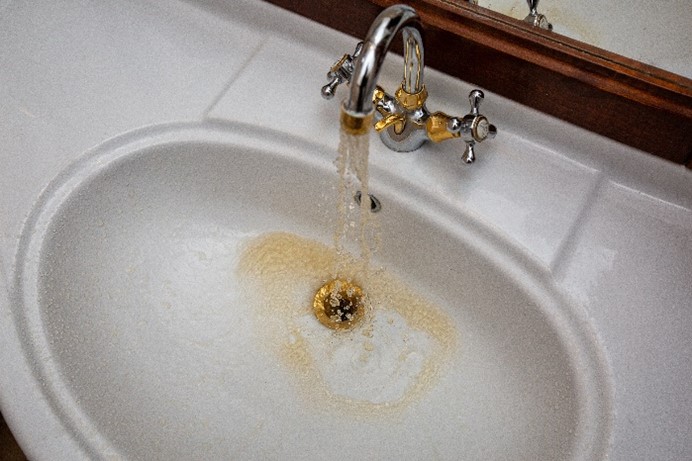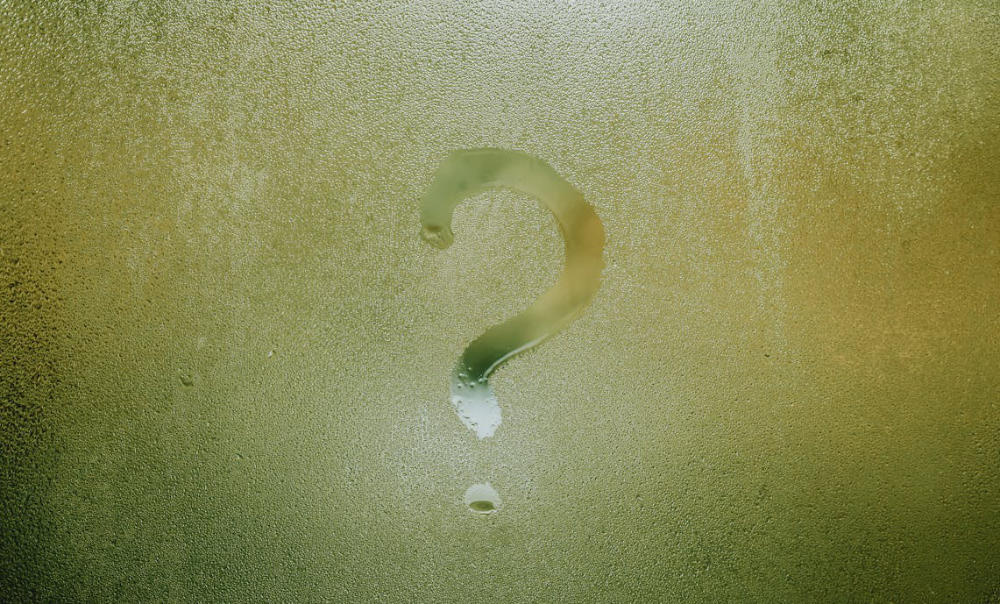What Causes Rusty Water and How to Fix It

Rusty water – the bane of every homeowner’s existence. One second you’re happily going about your day, the next you turn on the faucet and out comes a murky brown liquid straight out of a swamp monster’s lair. Yuck! Nothing kills that refreshing shower vibe or makes you second-guess drinking straight from the tap quite like discolored rusty water.
Whether it’s a temporary blip on the radar or an ongoing battle with iron-tinted tap water, that telltale reddish-brown hue is never a welcome sight. It’s the plumbing world’s way of waving a little red flag that something’s amiss behind the scenes with your water supply.
Before resigning yourself to a lifetime of rusty well water or investing in a Brita the size of a hot tub, let’s do some digging into what might be muddying up your H2O stream. Because while rusty water is unpleasant, it doesn’t have to be a permanent housemate if you can get to the root of the issue. From aging pipes to local construction disturbances and everything in between, there are more than a few potential causes that could be turning your water a lovely shade of rust.
Causes of Rusty Water
Okay, enough preamble – let’s dive into what’s likely causing that nasty discolored water situation you’ve got on your hands. Like most household headaches, rusty water issues typically boil down to a few main offenders messing with your plumbing’s pipe dream of clear, pristine H2O.
Old Pipes
If you live in an older home, your ancient iron pipes are probably public enemy #1 when it comes to rusty water. Think about it – those metal lines have been constantly exposed to water flow for decades. Over time, that iron is bound to react with oxygen molecules and start corroding and building up rust along the inside walls.
As that oxidation accumulates and starts flaking off, you’re left with an unsightly reddish-brown residue being pumped out of your taps. Newer homes with plastic or copper pipes don’t have to worry about this as much, but any iron plumbing with some age on it is susceptible to internal rust issues causing discoloration.
Municipal Water Shenanigans
But what if your home is newer construction with zero rust pipe problems? Well, sometimes the rusty water issue stems from good ol’ municipal water supply shenanigans outside your property lines.
Maybe there was a water main break that kicked up decades of sediment buildup. Or the utility company was doing work on distribution lines that disturbed settled rust particles. Even firefighters flushing hydrants can temporarily discolor the water flowing through nearby pipes. Any kind of major flow disturbance has the potential to stir up accumulated rust and send it your way for a bit.
Well Water Woes
For those on private well systems, you’ve got a whole separate set of rusty water demons to grapple with. Since that water is coming straight up from underground aquifers, it’s had plenty of contact with iron-rich rocks and soil that can lead to elevated mineral levels.
The deeper the well, the more concentrated iron and manganese it tends to pick up – giving the water an automatic rusty tinge right out of the tap. Bacterial growth feeding on that iron can also accumulate nasty rust sludge in well equipment over time. Those with shallow wells don’t have it quite as bad, but still have to stay on top of mineral buildup.
Water Heater Hangups
Your rusty water issue could also be isolated solely to the hot water coming out of certain taps and appliances. If that’s the case, your water heater tank is likely the main culprit allowing rust and sediment to accumulate unchecked.
As heated water cycles through month after month, any dissolved iron has a tendency to settle out along the bottom of the tank into a thick, cloggy sludge. That accumulated rust can not only restrict water flow but enable accelerated tank corrosion from constant water exposure once the protective anode rod wears down. Hello, permanent rusty hot water supply!
So whether it’s decaying pipes, municipal water disturbances, problematic well water, or a failing water heater tank – there’s plenty of potential causes for your home’s rusty water woes. The first step is pinpointing which rusty demon is truly to blame so you can go about treating the issue properly. Time to grab your sleuthing gear and get to the bottom of this iron-tinged mystery!
Identifying the Source of Rusty Water
We’ve gone over the prime suspects that could be giving your home’s water that nasty rusty tint. But before taking any action, you’ll need to channel your inner Sherlock and do some investigating to pinpoint the actual source of those funky brown dregs.
It’s rusty water detective time! By carefully observing the when and where, you can start narrowing it down to the likely culprit. Grab a notepad and put on your deerstalker cap, because a little DIY sleuthing is required.
The Faucet Rundown
Start by checking every sink, shower, and tap in your place to get a full scope on which fixtures are spitting out rusty water and which ones aren’t. If it seems isolated to just one bathroom or a couple fixtures, that points towards a localized pipe issue in that area.
But if every faucet is running brown no matter where you turn it on, that wide-ranging discoloration suggests the problem stems from your main supply line bringing water into the home. Knowing if it’s a broad or isolated case is a huge initial clue.
The Timing Tells
Along with location, keep an eye out for any patterns on when the rusty water tends to show up. If it’s a constant, persistent problem no matter when you turn on the taps, it likely points to either your main pipes or water heater continually pumping out discolored stuff.
However, if the rusty water only happens first thing in the morning or after not using any for a while, that’s a red flag for sediment buildup that’s just getting stirred up after sitting stagnant. Those timing clues can be key to cracking the case.
The Neighbor Recon
While you’re gathering evidence, extend your investigation radius by asking neighbors if they’ve had any rusty water issues too. If it’s just your home affected, that eliminates the possibility of municipal water supply hijinks causing it.
But if you discover there’s widespread discolored water in homes around you, that’s a solid indicator that some kind of water main work is likely kicking up sediment for the whole neighborhood.
The Utility Assist
For those times when the clues just don’t add up to any obvious conclusions, you may need to call in backup from your local water utility. They’ll have insider intel on any recent work that could be behind a sudden rusty water bout.
Most utilities also have staffers that can come test your water for things like high iron content that could signal a well water or pipe corrosion issue. A little expert insight can sometimes crack even the toughest discolored water case.
By doing some amateur detective work upfront, you’ve got a much better shot at identifying the real culprit before trying to fix that rusty water situation. Sure, it might take getting your hands a little dirty, but pinpointing the source is crucial. Once you know what’s causing those funky dregs, you can explore solutions for getting that fresh, clear flow restored!
Rusty Water Remedies
After putting in some solid detective work, you should have a pretty good idea of what’s behind your home’s rusty water woes by now. Time to take that diagnosis and start exploring some potential remedies for getting that funky brown flow back to a crisp, clear state again.
Depending on whether it’s an aging pipe situation, well water issue, or water heater problem causing the discoloration, you’ve got a handful of options for fighting back against iron oxidation. From quick temporary fixes to more permanent solutions, here’s your rusty water battle plan.
The Short-Term Triage
If you’re dealing with a temporary bout of rusty water, usually caused by some kind of municipal line disturbance or sediment shakeup, you’ve got a few quick triage options for getting drinkable water flowing again:
Flushing the Pipes – Sometimes simply running all your taps wide open for 15-20 minutes is enough to clear out any rust particles that got kicked up into your home’s plumbing. Just let it flow until the discoloration clears up.
Sediment Filter Install – For a more targeted fix, installing a small sediment filter right where your main water line enters the home can catch any rusty particles before they spread further. Just need to routinely remove and clean the filter.
Softener or Iron Filter – If you’re dealing with high iron content in your water supply itself, whether from municipal issues or a well, using a water softener system or specialized iron filter can help remove those rust-causing minerals.
Those stopgap solutions can help get you by in a pinch, but they’re really just temporary band-aids. For any ongoing or stubborn rusty water problems, it’s going to take a bigger, more permanent fix.
The Longterm Solutions
When quick flushing or filters just won’t cut it anymore, it’s time to look into some heavy-duty, long-lasting solutions for eliminating rusty water gremlins once and for all:
Repiping the Rusties – If you’ve got a serious case of decaying, corroded pipes on your hands, the best solution is going to be repiping all those aging metal lines with fresh PVC or PEX plastic pipes that won’t rust.
Addressing Well Water – For persistent high iron content in a well system, installing a water treatment system like a chlorination setup can help oxidize and filter out those rust-causing minerals for good.
Water Heater Overhaul – Whether it’s flushing out built-up sediment, replacing the sacrificial anode rod, or getting a whole new water heater installed, taking care of the rusty tank issue should clear up any discolored hot water.
While those permanent fixes require more effort and money upfront, they’re worth the investment to ensure you never have to deal with rusty water nightmares again down the road.
The Pro Assist
Of course, not every rusty pipe or well water situation is going to be a simple DIY job. When you’ve got major pipe degradation, complex mineral issues, or an ancient water heater on its last legs, it’s probably wise to call in the pros.
A licensed plumber or water treatment specialist will have the proper tools and expertise to properly diagnose and fix even the most stubborn rusty water problems. While it’ll cost you for their services, it beats the potential for making an expensive mistake by tackling a major plumbing overhaul yourself.
Plus, when it comes to something as crucial as your home’s water supply, you really want to make sure the job gets done right the first time around. No one wants a botched pipe replacement or water heater install to leave you right back in rusty water purgatory a few months down the road.
So don’t be afraid to call in an expert assist when needed! The peace of mind and long-term solution are worth it to finally get that clean, rust-free water flowing again without any lingering issues.
Reviving Pure Water Bliss
Look, no homeowner should be forced to endure the constant annoyance of rusty, discolored water steadily dripping from every faucet. Beyond being a major eyesore, those pesky iron oxide particles can seriously wreak havoc on your pipes and appliances if left to build up unchecked over months and years.
The good news? By rolling up your sleeves and putting in some elbow grease with the troubleshooting steps and remedies covered here, you’ve got a fighting chance at finally banishing those funky brown water blues back to their watery grave for good. Whether a simple flushing does the trick, throwing on a filter provides a temporary band-aid, or you finally buck up for an entire repiping job – don’t resign yourself to rusty water purgatory.
But let’s be realistic, even your most heroic DIY efforts may just fall short against the most insanely stubborn iron demons. When you’ve thrown every trick in your arsenal at those rusty dregs to no avail, it’s time to call in the big gun professionals at Precision Today. Our seasoned plumbing warriors have spent years sharpening the tools and know-how to properly diagnose and rectify even the nastiest, most persistent rusty water situations.
Don’t settle for discolored water flow cramping your home’s style any longer. Fight back and restore that crisp, clean water bliss by ringing up Precision Today’s rusty slayers at (630) 425-8995 today.



Join the Precision Today Zero Problems Plan! As a member, you’ll receive all these benefits and more:
- Seasonal HVAC Maintenance
- Priority service
- No dispatch fees
- Transferrable membership
- 10% discount on future repairs
When you sign up for the Zero Problems Plan, you'll gain access to exclusive discounts, providing everyday savings on the services you need.
Ready to streamline your plumbing, heating, cooling, and electrical maintenance needs? Join today by calling (630) 425-8995.







